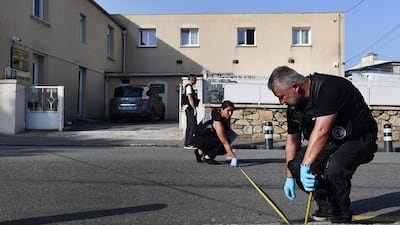Investigators are examining the troubled background of a man believed to have shot a French imam who had received threats from both ISIS and ultra-right extremists.
Rachid Eljay, 39, was seriously wounded in the abdomen and legs when shot four times in the port of Brest, in the western region of Brittany, on Thursday.
His life and that of a 26-year-old worshipper who was also shot are not in danger. The killer had approached them outside the mosque in the Pontanezen district on the pretext of wanting a “selfie” with the imam.
A 21-year-old French man believed to have carried out the attack was later found dead 500 metres from his car in another part of Brest. He had apparently shot himself in the head.
Named in French reports and on social media as Karl Foyer, he had sent a rambling two-page letter to another imam, also posting its contents on Facebook, claiming to have been ordered to murder Mr Eljay by three masked men who forced him into a van. Foyer wrote that the men warned him they would kill his parents and sister if he did not obey their instructions.
After early speculation that the killer may have had extreme right-wing connections, a police source told media he was unknown to the security services and was not linked to any right-wing or Islamist group.
His letter also mentioned a retired French intelligence chief who, according to him, had been in contact with one of the three men who accosted him.
But prosecutors and police are more inclined to believe he was a deranged individual acting on his own initiative.
Mr Eljay has been a controversial figure for several years.
Previously known for adopting “non-jihadist Salafism”, he took over at the mosque in place of an imam whose radical preachings led to his expulsion to his native Algeria.
The religious newspaper La Croix recalled a 2015 video showing the self-taught preacher, then calling himself Rachid Abou Houdeyfa, telling children music was a "creature of the devil" and that listening to it would turn them into monkeys or pigs.
In one sermon, Mr Eljay said the hijab was a “woman’s honour”. If she “goes out without honour”, he added, “do not be surprised that men abuse this woman".
More recently, however, he has shown a fundamental change in his outlook and a desire to teach Islam in a secular French context. He obtained a diploma qualifying him to “provide civic and citizenship training”.
The French Muslim Council said the imam’s public comments, espousing French republican values, had brought him a death threat from ISIS in 2016.
Romain Caillet, a specialist in contemporary Salafism, said Mr Eljay was detested as fiercely by ultra-right elements.
Mr Caillet posted a tweet at the end of 2017 with a series of photographs tracing Mr Eljay’s conversion to a more moderate stance by reference to his appearance. In the last, from his graduation, he wears western-style clothing indistinguishable from that of other students
"Today, he advocates a practice of Islam that is not out at odds with his environment, his beard is becoming shorter and his style of clothing has changed," Mr Caillet told the newspaper 20 Minutes.
In a tweet, he strongly criticised sections of the media that continued to associate the preacher with views he no longer held, “helping to make him a target”.
The suspected killer was Paris-born but had been living in the eastern city of Lyon for three years and drifted from one lowly job to another, according to his letter. The council of mosques covering that area of France has deplored what it sees as a relative political and media silence over the imam’s shooting.
In fact, French news media, print and broadcast, have reported fully on the attack while pointing out that the public prosecutor has ruled out, on the facts as known, any terrorist connection.
According to the French interior ministry, the number of anti-Muslim incidents in France fell from 121 in 2017 to 100 last year. Muslim lobby groups challenge the statistics, which they say are distorted by a reluctance to report attacks, and say the reality indicates a significant rise.



